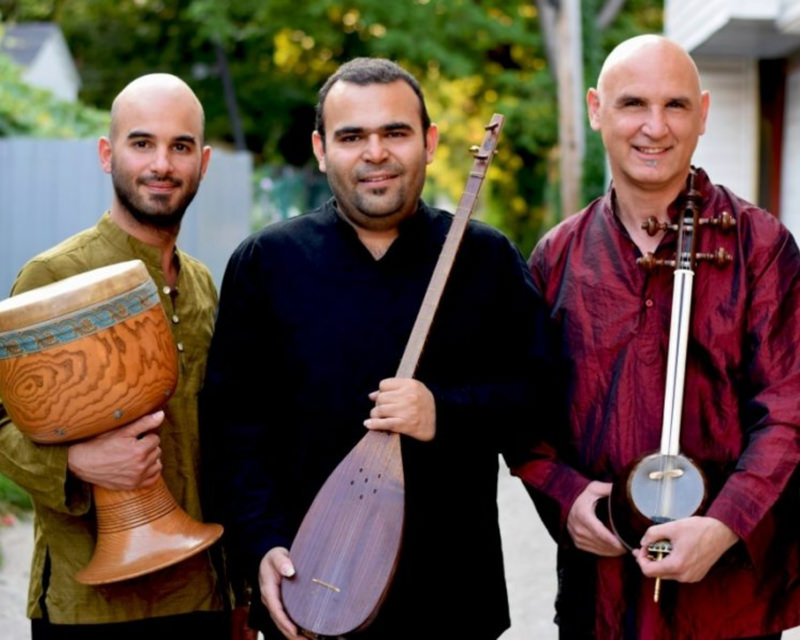
Saturday March 20 2021, 7:30 PM
Invisible
Saturday 20 March – 7:30 PM
Featuring
Saeed Kamjoo
kamanche
Pooria Pournazeri
tanbour
Ziya Tabassian
percussion / director / composer
About
“Invisible” is a new virtual concert by Regard Persan exploring the sounds of Persian music through kamanche, tanbour and percussion. The pieces featured are all original compositions by members of the trio, with inspiration for the works ranging from personal reflections of home to musical and rhythmic structures. At its foundation, “Invisible” delves into the enriched and complex sounds of classical Persian music through a modern lens. Each member explores the sounds of Persian music through ancient Middle Eastern instruments, some dating back to the third millennium BC.
Regard Persan is bridging the gap between tradition and modernity, to create contemporary music that is aurally timeless. Formed after the trio’s magical concert premiere at the 2013 Garage Concerts series in Montreal, Regard Persan has performed in Canada, Europe, Mexico, and China. “Invisible” is on a virtual tour across Atlantic Canada with Debut Atlantic and their concert is featured by Musique Royale on Saturday, March 20 at 7:30 pm.
As one of Canada’s most prestigious classical music organizations, Debut Atlantic is committed to developing young artists and establishing new initiatives that enhance the cultural life of Atlantic Canada. Since 1979 it has treated Atlantic audiences to Canada’s most promising young musicians. Celebrating 41 years, Debut Atlantic has featured over 400 artists, gracing the stages of venues from Happy Valley-Goose Bay, Newfoundland and Labrador to Yarmouth, Nova Scotia. Full details on Debut Atlantic’s concert seasons and educational programs can be found at www.debutatlantic.ca.
Program
- Winter in Quebec - Pooria Pournazeri
- Flying Sky - Saeed Kamjoo
- Innocent Tears - Pooria Pournazeri
- Crossed Parallels - Saeed Kamjoo
- Invisible Circle - Ziya Tabassian
- Tehran - Saeed Kamjoo
About the Artists
Saeed Kamjoo, kamanche
Saeed Kamjoo, born in 1965 in Tehran, Iran, is a Persian musician and composer. As a graduate of Tehran University, he furthered his studies in the instrumental and vocal repertoires of Classical Persian music under the guidance of such renowned masters as Ali Akbar Shekârchi and Ustad Asghar Bahâri. Kamjoo’s approach to playing kamanche is based on his perception of the values inherent in classical Persian music. Kamjoo’s style of playing combines creativity and authenticity with innovation. Although his music is rooted in classical Persian music, he frequently explores modern concepts in his performances.
Kamjoo moved to Montreal, Canada, in 1997 and has since collaborated with various ensembles throughout North America and Europe. He has recorded multiple albums and performed in numerous music festivals in Canada, Mexico, U.K, France, Germany, Netherlands, Belgium, Norway, Sweden, Spain, Portugal, Poland, Greece, Turkey, Hong Kong, and the United States. Kamjoo has also performed as a guest artist with the Dastan Ensemble, one of the most renowned Persian musical groups. As a composer, he has written music for string quartet and voice based on the poetry of Omar Khayyám (12th c.), which was performed in Toronto, Canada, in 2012. His new album, No dawn, No dusk, for qheychak solo was released in summer 2015.
Pooria Pournazeri, tambour
Pooria Pournazeri began his tanbour studies (lute from Kurdistan) at the age of 6. His first teacher was his uncle, Keykhosrow Pournazeri, a performer and pedagogue of Sufi music. During his studies, he learned traditional Persian and Kurdish repertoire. As an award-winning tanbourist, his first performance was at the age of 16 at the Fajr Music Festival in Tehran, Iran. He is also a composer, whose music draws inspiration from his early training in classical Persian music. Following his studies, Pournazeri joined the prestigious Shams Ensemble, with whom he collaborated on the best-selling Iranian album Mastan Salamat Mikonand. In 2009, he helped establish the Rivaan Ensemble with Majid Pousti and Ostaad Bijan Parvaz. In the same year, he recorded a new album titled Let’s Make the Earth Peaceful as part of the project “Act on Climate Change,” initiated by the United Nations. In 2011, he launched his first solo album, described as the “best album of October 2011” by Songlines magazine.
Since his arrival in Montreal, Pournazeri has frequently collaborated with the Tabassian brothers and Ensemble Constantinople. He has appeared in several musical and multidisciplinary events, including the opening of the Aga Khan Museum in Toronto in September, 2014.
Ziya Tabassian, percussion
Ziya Tabassian began playing the tombak (Iranian drum) at the age of ten. Following his early studies in Iran, he continued his autodidactic training in Quebec, his adopted homeland.
From 1994 to 2001, Tabassian studied classical Western percussion with Julien Grégoire, and obtained a Bachelor’s degree in interpretation from the Université de Montréal. During a residency at The Banff Centre in the winter of 2003, he began exploring contemporary repertoire with Iranian percussion instruments, which was to have a lasting influence on his music and career. Tabassian has also studied and participated in advanced courses with Bahman Rajabi (Teheran), Aziz Alami (Fez), Trichy Sankaran (Toronto), Mısırli Ahmet (Istanbul), Shree Sundarkumar, and Yogesh Samsi (India).
As a percussionist, Tabassian is professionally active in early, contemporary, current, and world music. He performs with several musical ensembles, including the Persian music trio, Regard Persan, and Ensemble Caprice. Throughout his career, he has appeared in concert halls and music festivals in more than 40 countries.
Supported by the Conseil des arts et des lettres du Québec and the Canada Council for the Arts, Tabassian has recorded and collaborated on numerous albums. His first solo album, titled Tombak, released in 2007 on the Ambiances Magnétiques label, was inspired by his acoustic explorations and research on early Persian music’s rhythmic cycles. His second solo album, The Circle of the Cycles, released in 2017, was based on the rhythmic cycles and new techniques on the tombak. He is now releasing his third solo album. He has also collaborated and recorded with the Kronos Quartet, Kayhan Kalhor, Mercan Dede, Hossein Omoumi, En Chordais, and Lo’Jo.